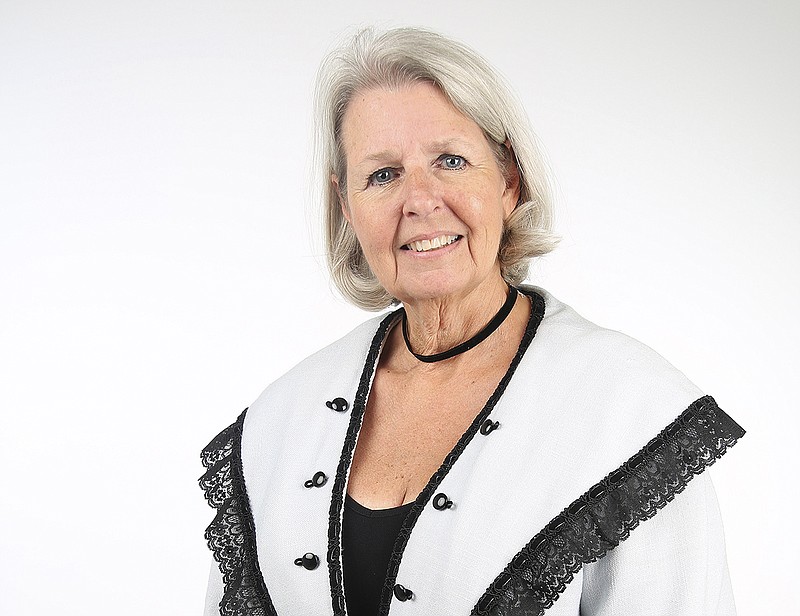Name: Linda Mines
Age: 66
Hometown: Baxter, Tenn.
Occupation: City and county historian
Linda Mines is among the one in four Americans who can't fit their cars in their garage due to all the other items stored there. In Mines' case, however, it is not mementos of her own life that overtake boxes and crowd every available corner, but, rather, those of others. As the official historian for both the city of Chattanooga and Hamilton County - and a firm believer in engaging people through education - Mines has accumulated quite the inventory of historical artifacts.
"Our garage is filled with 100 or more historical costumes," she admits, adding, "If you can get people to awaken all their senses to see and to feel and to think, you will awaken their hearts, and then you can get their minds." And we've all heard what befalls those who don't know their history.
Growing up on her family's fourth-generation farm in northern Middle Tennessee, Mines was primed for the role early on. After graduating with a bachelor's and master's in education, she spent 45 years teaching, culminating in 22 years as chair of the history and social sciences department at GPS. Later appointed by both the city and county mayor, she now serves as a consultant for local government when dealing with properties or major events related to history. That might mean helping to organize a commemoration for veterans one week and unearthing the stories of local historic sites and bringing them to the forefront the next, or even helping families trace their lineage. "Quite frankly, it's every history nerd's dream job," she says.
***
» History was my favorite subject in high school. I graduated early when I was 16, and started college. I was pre-med at the beginning. Somewhere around my junior year, I thought, "This is not what I want to do. I really like history." Of course, in the back of my mind I'm thinking, "I will sit on the side of the road and starve with a sign saying, 'Please help. I love history.'"
» My goal was to teach. I thought, "I can touch lives and touch hearts." I think I would've loved medicine, but there's something so personal for everyone when you start talking history.
» Family history is a great way to get into it. If we know who we are and from where we come, it gives us a greater ability to face struggles in our lives. So often we're lulled into thinking family members will be with us forever and we don't ask those questions - memories of the Great Depression, or where they were when they heard about Pearl Harbor, or even their first day of school.
» One thing I believe strongly is when we connect with people and share their history, as long as we remember those people and say their names aloud, they're never truly dead. Once we forget those individuals, the history of any community is just this bland historical gloss.
» If I'm allowed to have a historical crush on a character, I have one on Abby Crawford Milton. In a time when women didn't even work, she got her law degree. She was key in the passage of the 19th amendment. She was the first Tennessee president of the League of Women Voters. She was one of two people instrumental in getting Great Smoky Mountains National Park created. She moved to Florida and became the [Florida] poet laureate. She lived to be 106 years old. The woman could do everything and no one knows who she is.
» I worry that we don't know our history the way we used to. I think we're so absolutely in the moment, whether it's social media or whatever, that we've lost sight of the fact that the past had a tremendous impact on the present, which will then impact the future. It's almost like a tapestry with threads woven in it, and if we don't weave the threads right, there's going to be gaps.
There are certain things people should just know about their nation and be proud of - and be cognizant of the fact that there were also horrible failures and we should change.
There are things that occurred in our history that are uncomfortable, and I recognize that. We're flawed human individuals and therefore we make mistakes. It's our responsibility to correct those mistakes. If we don't understand how those mistakes occurred, we don't have a road map to fix those.
» I think what we have to learn to do is to talk about history. We have to have healthy conversations so people don't look back 100 years from now and say, "Can you believe those people (fill in the blank)?" We can't erase history because it's unpleasant, we have to use it as a teaching tool for tomorrow.
» It's not so much that you need to know dates and names. The dates and things come later. What you have to do for people to understand how important their history is is get their hearts first with the struggles, the quest for freedom and equality. That's an ongoing evolutionary process.
» I think sometimes the crisis we have in our lives comes from not understanding how to connect. It's important to connect to something bigger ... and history gives us a way to do that.
